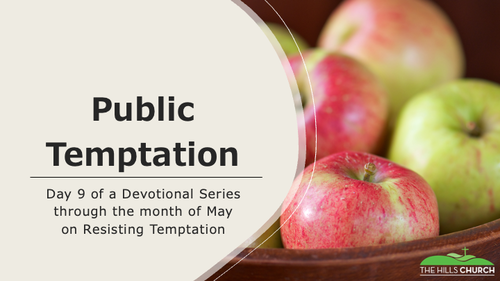Day 9 - Public Temptation
Because you have kept my word about patient endurance,
I will keep you from the hour of trial that is coming on the whole world,
to try those who dwell on the earth.
Rev 3:10 (ESV)

What is Public Temptation?
Owen notes that one way to categorize temptations is as either public or private. But what does he mean by "public temptation?"
Owen describes public temptation as a temptation that "comes up on the world 'to try them that dwell upon the earth.'" (Rev 3:10) It is a temptation that is "a combination of persecution and seduction for the trial of a careless generation of professors." That is, a public temptation is one that God brings upon the public more generally (versus a private temptation that is brought upon a specific person more individually...more on private temptation tomorrow).
Owen describes public temptation as a temptation that "comes up on the world 'to try them that dwell upon the earth.'" (Rev 3:10) It is a temptation that is "a combination of persecution and seduction for the trial of a careless generation of professors." That is, a public temptation is one that God brings upon the public more generally (versus a private temptation that is brought upon a specific person more individually...more on private temptation tomorrow).
The Purpose of Public Temptation
Public temptation is directed more generally towards the public ("the whole world") so that "God uses such a trial to revenge the neglect and contempt shown to the gospel on the one hand, and the treachery of false professors on the other." That is, public temptation is an act of justice by God. It is simultaneously an act of discipline upon those who follow Christ but neglect obeying the gospel in their lives and an act of judgment upon those who merely profess to follow Christ but do not truly do so. (2 Thes 2:11)
The Difficulty in Resisting Public Temptation
Public temptation can be difficult to resist for two reasons:
1) The principle of Christian freedom can be used to rationalize that the sin is not sin (when in fact it is just sin).
2) It can be easier to ignore the temptation that to address it.
In both cases diligence and careful consideration of what Scripture teaches must be given. There are indeed practices that Christians are at liberty to do or not to do; we must not label these practices sin. These we must recognize as part of Christian freedom. But we should never use "Christian freedom" to enable or justify sin that is prohibited in Scripture. Nor should we turn a blind eye in our lives to temptation and just ignore it as if God will deal with it another way. We must resist it and "obey the gospel." (2 Thes 1:8; 1 Pet 4:17)
1) The principle of Christian freedom can be used to rationalize that the sin is not sin (when in fact it is just sin).
That is, rather than recognizing the temptation as that which leads to sin, the principle of Christian freedom is used as the reason to say it is not really sin.
2) It can be easier to ignore the temptation that to address it.
This is being tempted to just ignore a temptation and leave it up to God to deal with. If something is indeed a sin, then the temptation to do it cannot be ignored.
In both cases diligence and careful consideration of what Scripture teaches must be given. There are indeed practices that Christians are at liberty to do or not to do; we must not label these practices sin. These we must recognize as part of Christian freedom. But we should never use "Christian freedom" to enable or justify sin that is prohibited in Scripture. Nor should we turn a blind eye in our lives to temptation and just ignore it as if God will deal with it another way. We must resist it and "obey the gospel." (2 Thes 1:8; 1 Pet 4:17)
Our Challenge
We must examine our lives to see if we are using the principle of Christian freedom (that there are some things that Christians are at liberty to differ on) as a rationalization our neglect and disobedience of the gospel. We must examine our lives to see if we are ignoring temptation and sin in our own lives by saying that "God will deal with it; I does not need to concern me." If we know that Scripture has called something a sin, then we have a duty to obey the gospel, to resist the temptation, and a duty to kill it in our lives so that we do not sin.
